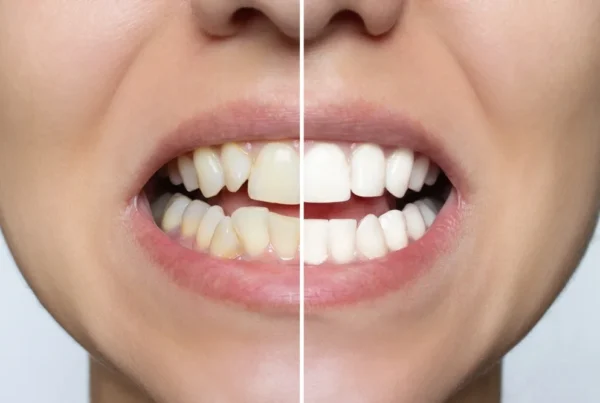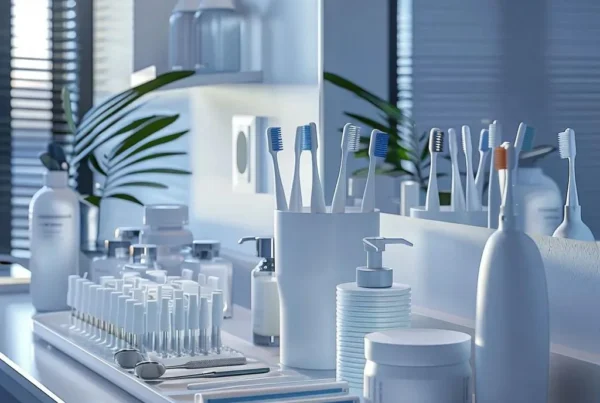Composite veneers offer a fast, cost-effective, and minimally invasive way to transform your smile. But as with any dental restoration, they are not permanent. Over time, composite veneers can show signs of wear, discoloration, or fit issues—making replacement a necessary part of their lifecycle. Understanding when, why, and how to replace composite veneers is critical for preserving both the function and appearance of your smile.
At Fountain of Youth Dental, we prioritize educating patients about the long-term management of their dental work. Our goal is to help you recognize the signs of veneer deterioration early, explore whether repair or replacement is appropriate, and support your decisions with expert guidance. This guide covers everything you need to know about composite veneer replacement—from warning signs and lifespan expectations to modern treatment options and care strategies that maximize their durability.
The Lifespan of Composite Veneers and What Affects It
Composite veneers typically last between 5 and 7 years, although with exceptional care, they can remain functional for up to a decade. The materials used in composite veneers are durable but more prone to wear and discoloration than porcelain. Environmental exposure, dietary habits, and oral hygiene all play a role in determining how long a veneer remains effective and attractive.
Daily wear and tear is inevitable. Even simple acts like chewing hard foods or drinking acidic beverages can create microfractures or erode the surface over time. Additionally, lifestyle choices like smoking or drinking red wine may lead to staining that isn’t easily removed. While composite veneers are easily repaired, recognizing when they have reached the end of their functional life is key to avoiding more serious dental issues and maintaining aesthetic harmony in your smile.
Why Timely Replacement Matters
Replacing composite veneers before they deteriorate significantly is essential for maintaining oral health and cosmetic appeal. As materials degrade, they lose their ability to protect the underlying tooth and may begin to look uneven or discolored. Allowing these veneers to remain in place past their optimal lifespan increases the risk of damage to the tooth beneath and can affect adjacent teeth or the bite.
Timely replacement also ensures consistent appearance and confidence. Veneers that begin to chip, stain, or lose their luster can become noticeable and detract from the overall appearance of your smile. At Fountain of Youth Dental, we emphasize proactive assessments so patients can replace their veneers at the right time, avoiding discomfort and ensuring their smiles stay beautiful and balanced for years to come.
Key Factors That Influence Veneer Longevity
Several core factors affect how long your composite veneers will last. Good oral hygiene, including brushing with non-abrasive toothpaste and flossing daily, helps minimize plaque buildup and preserves the bond between the veneer and tooth. Equally important is attending regular dental checkups, where we monitor wear and catch early signs of failure before they become serious problems.
Lifestyle habits are another major determinant. Patients who frequently consume staining foods or beverages like coffee, tea, or wine may notice their veneers discolor sooner. Smokers face similar issues, as nicotine and tar can discolor composite materials over time. Additionally, habits like teeth grinding, nail-biting, or using your teeth as tools can accelerate damage and decrease the veneers’ lifespan. Being aware of these risks and adjusting behavior accordingly plays a major role in preserving your veneers and delaying the need for replacement.
How Lifestyle Choices Impact Veneer Integrity
Diet and daily routines contribute significantly to the condition of your composite veneers. Highly pigmented foods and beverages can discolor the composite resin, leading to uneven or dull coloring. Acidic items, like citrus fruits or vinegar-based dressings, can wear down the surface of the veneers, accelerating the need for professional intervention. Limiting these foods—or following them with water and brushing—can help protect your veneers.
Smoking is another critical factor. The chemicals in tobacco stain and degrade composite materials faster than porcelain. Smokers often notice their veneers become yellowed or less glossy over time. Additionally, routine dental care—including professional cleanings and guidance on the best products for your specific needs—ensures that lifestyle factors don’t undermine the investment you’ve made in your smile. At Fountain of Youth Dental, we provide personalized strategies to support patients in preserving the appearance and functionality of their veneers.
Recognizing the Signs That Veneers Need Replacement
Knowing when to replace composite veneers can prevent more serious dental issues and maintain the integrity of your smile. Some signs are visual, such as discoloration, surface dullness, or small chips. Others are functional, including a loose fit, increased sensitivity, or discomfort while eating or brushing. These issues indicate that the veneer’s bond may be compromised or that the material itself has degraded.
Gum recession is another red flag. As gums recede naturally with age or due to periodontal disease, the margins of the veneer can become exposed, affecting aesthetics and increasing the risk of decay. A professional evaluation at the first sign of these issues is the best way to determine whether a quick repair is possible—or if a full replacement is warranted. At Fountain of Youth Dental, we conduct detailed assessments to identify the right course of action and keep your veneers performing at their best.
Deciding Between Repair and Replacement
Some composite veneer issues can be resolved with minor repairs. Small chips, discoloration, or surface dullness may be addressed with polishing or adding new layers of composite resin. These in-office touch-ups are cost-effective and allow you to maintain the appearance of your smile without undergoing full replacement. When damage is minimal, this approach is ideal for extending the life of your current veneers.
However, if the veneer is structurally compromised—such as from recurring damage, large chips, or persistent discomfort—replacement is the more appropriate solution. Replacement allows for the integration of updated materials and techniques that may offer better longevity and a more refined aesthetic result. During your consultation, we evaluate the cost, durability, and expected outcomes of both options to help you choose the most practical solution for your dental needs.

Understanding the Veneer Removal and Replacement Process
Removing composite veneers is relatively straightforward, especially compared to porcelain veneers. Because composite veneers are bonded with less invasive adhesives and require minimal enamel removal during placement, they can often be gently removed without harming the underlying tooth structure.
Our team uses advanced tools to detach composite material while preserving your natural enamel. This conservative approach enables a smooth transition to new veneers with minimal risk or discomfort. Updated adhesive and etching technologies also allow for a stronger bond during reapplication, resulting in improved longevity and appearance. At Fountain of Youth Dental, we utilize the latest techniques to ensure that the replacement process is efficient, comfortable, and tailored to the needs of your smile.
How to Care for Your New Composite Veneers
Once your new veneers are in place, protecting them begins with the same care principles that kept your original veneers healthy. Daily brushing with a soft-bristled toothbrush and non-abrasive toothpaste will maintain their smooth surface and prevent damage. Flossing remains critical for keeping the veneer margins clean and protecting surrounding gums from inflammation or plaque buildup.
Professional cleanings and checkups every six months provide deeper care, allowing your dentist to detect potential problems early and extend the lifespan of your veneers. If you’re prone to grinding or clenching, a nightguard can distribute pressure evenly and prevent fractures. We recommend lifestyle adjustments—like drinking dark beverages through a straw or limiting hard snacks—that reduce wear and help maintain your veneers’ color and integrity over time.
Best Practices to Prolong Veneer Durability
Extending the life of your composite veneers involves a combination of quality materials, regular maintenance, and smart habits. Choosing high-quality dental resins during the fabrication stage is essential. At Fountain of Youth Dental, we use advanced composite formulas that resist staining and withstand everyday forces more effectively than older materials.
Maintaining routine care is equally important. In addition to brushing and flossing, patients should schedule biannual cleanings and checkups. These visits allow us to monitor the veneers’ condition and intervene early if any issues arise. For added protection, some patients benefit from the application of resin fortifiers, which reinforce the surface and reduce susceptibility to damage. These preventive steps keep your veneers looking and feeling great long after placement.
Conclusion: Keeping Your Smile Healthy with Timely Veneer Replacement
Composite veneers provide an affordable and effective way to enhance your smile, but they do require attention and timely maintenance. Recognizing when it’s time to replace your veneers—and knowing how to care for them in the meantime—can make the difference between a confident, radiant smile and one that slowly diminishes due to wear or damage.
At Fountain of Youth Dental, we provide patients with expert support at every stage of their veneer journey. From the first application to years later when replacement becomes necessary, we’re here to ensure your smile stays bright, healthy, and completely you. With the right care and timely replacement, your composite veneers will continue to deliver the results you expect and deserve.
FAQs About Composite Veneer Replacement
How long do composite veneers typically last?
Composite veneers usually last between 5 and 7 years, though this can vary based on your oral hygiene and habits. With diligent care and regular checkups, some patients enjoy their veneers for up to a decade before replacement becomes necessary.
Are composite veneers easy to replace?
Yes. Thanks to their minimally invasive application, composite veneers are easier to remove and replace than porcelain. The process often requires little to no additional enamel reduction, making it safe and efficient. Your dentist will assess the condition of the existing veneer and recommend the best course of action.
What are the signs that my veneers need replacing?
Key signs include discoloration that doesn’t respond to polishing, chips or cracks, looseness, discomfort, and visible gaps at the veneer’s edge. If your veneers no longer blend seamlessly with your natural teeth or feel uncomfortable, it’s time to consult your dentist about replacement.
Ready for a dentist who cares as much as you do about your smile? Contact Dr. Cappetta today to schedule a no-pressure consultation. You can also call us at (210) 614-5481.
With Fountain of Youth Dental, you can stop settling and finally get the healthy, stunning smile you deserve!
Schedule Your Free Consultation Today!
Fountain of Youth Dental
5282 Medical Dr. #520 San Antonio, TX 78229 (210) 614-5481 Driving Directions





